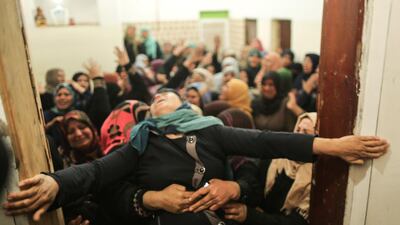Israel will increase its reaction to demonstrations along the Gaza border if clashes continue, the country's chief military spokesman said on Saturday.
According to Brig Gen Ronen Manelis, the military has so far restricted its response. Brig Manelis says all those killed were engaged in violence.
United Nations Secretary General Antonio Guterres called for an independent and transparent investigation into clashes at the Gaza fence on Friday between Palestinians participating in the Great Return March and Israeli security forces which resulted in at least 16 deaths and many injured.
In addition to the 16 killed, more than 1,400 were wounded, 758 of them by live fire, with the remainder hurt by rubber bullets and tear gas inhalation, according to the Gazan health ministry.
The UN's call for an investigation came as the Security Council held an emergency meeting into the deadly incidents.
Friday's Security Council session was requested by Kuwait.
At least sixteen were killed by Israeli fire on Friday after thousands of Palestinians marched to Gaza's border with Israel.
Friday was observed as Land Day to mark the anniversary of the killing of six Palestinians by Israeli forces during protests on March 30, 1976 against government plans to seize land for settlement.
Thousands of Gaza residents streamed to five tent encampments, each located about several hundred metres from the border. From there, large crowds marched to the fence, and some among them started throwing stones at soldiers who responded with live fire, tear gas and rubber bullets.
Hamas organisers said there will be six weeks of daily protests against a border blockade.
It was the bloodiest day in Gaza since the 2014 cross-border war between Israel and Hamas.
The Palestinian Health Ministry said more than 750 were wounded by Israeli fire.
The Israeli military said thousands of Palestinians threw stones and rolled burning tyres toward troops on the other side of the border fence.
________________
Read more:
Palestinians killed and hundreds injured in clashes along Israel-Gaza border
Abbas accuses Hamas of bomb attack on Palestinian premier
_______________
On Saturday Palestinians prepared for further protests. Protesters began returning to a tent city erected near the border with Israel to resume the demonstration planned to last six weeks in the blockaded enclave.
Thousands were attending funerals for those killed, with mourners holding Palestinian flags and some chanting "revenge."
A general strike was being held in both the Gaza Strip and the occupied West Bank.
Palestinian president Mahmud Abbas declared Saturday a day of national mourning and in a speech said he held Israel fully responsible for the deaths.
"The large number of martyrs and people wounded in peaceful popular demonstrations shows that the international community must intervene to provide protection to our Palestinian people," he said.
An Israeli military spokesman said Friday's events were "not a protest demonstration" but "organised terrorist activity."
Protests along the border are common, often culminating in young Palestinian men throwing stones at Israeli soldiers who respond with tear gas along with rubber and live bullets.
But the "March of Return" protest that began on Friday is larger scale and is intended to involve families with women and children camping in tent cities near the border for weeks.

